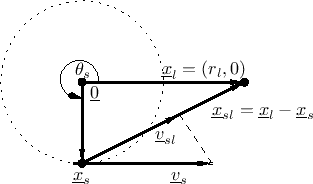Next |
Prev |
Up |
Top
|
Index |
JOS Index |
JOS Pubs |
JOS Home |
Search
The heart of the Leslie effect is a rotating horn loudspeaker. The
rotating horn from a Model 600 Leslie can be seen mounted on a
microphone stand in Fig.5.7. Two horns are apparent, but
one is a dummy, serving mainly to cancel the centrifugal force of the
other during rotation. The Model 44W horn is identical to that of the
Model 600, and evidently standard across all Leslie models
[190]. For a circularly rotating horn, the source
position can be approximated as
![$\displaystyle \underline{x}_s(t) = \left[\begin{array}{c} r_s\cos(\omega_m t) \\ [2pt] r_s\sin(\omega_m t) \end{array}\right] \protect$](img1294.png) |
(6.8) |
where  is the circular radius and
is the circular radius and  is angular velocity.
This expression ignores any directionality of the horn
radiation, and approximates the horn as an omnidirectional radiator
located at the same radius for all frequencies. In the Leslie, a
conical diffuser is inserted into the end of the horn in order to make
the radiation pattern closer to uniform [190], so the
omnidirectional assumption is reasonably accurate.6.10
is angular velocity.
This expression ignores any directionality of the horn
radiation, and approximates the horn as an omnidirectional radiator
located at the same radius for all frequencies. In the Leslie, a
conical diffuser is inserted into the end of the horn in order to make
the radiation pattern closer to uniform [190], so the
omnidirectional assumption is reasonably accurate.6.10
Figure 5.7:
Rotating horn
recording set up (from [470]).
![\includegraphics[width=4.1in]{eps/hornrecordingr}](img1297.png) |
By Eq.(5.3), the source velocity for the circularly rotating horn is
![$\displaystyle \underline{v}_s(t) = \frac{d}{dt}\underline{x}_s(t) = \left[\begin{array}{c} -r_s\omega_m\sin(\omega_m t) \\ [2pt] r_s\omega_m\cos(\omega_m t) \end{array}\right] \protect$](img1298.png) |
(6.9) |
Note that the source velocity vector is always orthogonal to the
source position vector, as indicated in Fig.5.8.
Figure 5.8:
Relevant geometry for a rotating horn
(from [470]).
 |
Since
 and
and
 are orthogonal,
the projected source velocity Eq.(5.4) simplifies to
are orthogonal,
the projected source velocity Eq.(5.4) simplifies to
 |
(6.10) |
Arbitrarily choosing
 (see Fig.5.8), and
substituting Eq.(5.8) and Eq.(5.9) into Eq.(5.10) yields
(see Fig.5.8), and
substituting Eq.(5.8) and Eq.(5.9) into Eq.(5.10) yields
![$\displaystyle \underline{v}_{sl}= \frac{-r_l r_s\omega_m\sin(\omega_m t)}{r_l^2 + 2r_l r_s\cos(\omega_m t)+r_s^2} \left[\begin{array}{c} r_l-r_s\cos(\omega_m t) \\ [2pt] -r_s\sin(\omega_m)t \end{array}\right]. \protect$](img1303.png) |
(6.11) |
In the far field, this reduces simply to
![$\displaystyle \underline{v}_{sl}\approx -r_s\omega_m\sin(\omega_m t) \left[\begin{array}{c} 1 \\ [2pt] 0 \end{array}\right]. \protect$](img1304.png) |
(6.12) |
Substituting into the Doppler expression Eq.(5.2)
with the listener velocity  set to zero yields
set to zero yields
![$\displaystyle \omega_l = \frac{\omega_s }{1+r_s\omega_m\sin(\omega_m t)/c} \approx \omega_s \left[1-\frac{r_s\omega_m}{c}\sin(\omega_m t)\right], \protect$](img1306.png) |
(6.13) |
where the approximation is valid for small Doppler shifts.
Thus, in
the far field, a rotating horn causes an approximately
sinusoidal multiplicative frequency shift, with the amplitude
given by horn length  times horn angular velocity
times horn angular velocity  divided
by sound speed
divided
by sound speed  . Note that
. Note that
 is the
tangential speed of the assumed point of horn radiation.
is the
tangential speed of the assumed point of horn radiation.
Next |
Prev |
Up |
Top
|
Index |
JOS Index |
JOS Pubs |
JOS Home |
Search
[How to cite this work] [Order a printed hardcopy] [Comment on this page via email]
![$\displaystyle \underline{x}_s(t) = \left[\begin{array}{c} r_s\cos(\omega_m t) \\ [2pt] r_s\sin(\omega_m t) \end{array}\right] \protect$](img1294.png)
![]() and
and
![]() are orthogonal,
the projected source velocity Eq.(5.4) simplifies to
are orthogonal,
the projected source velocity Eq.(5.4) simplifies to